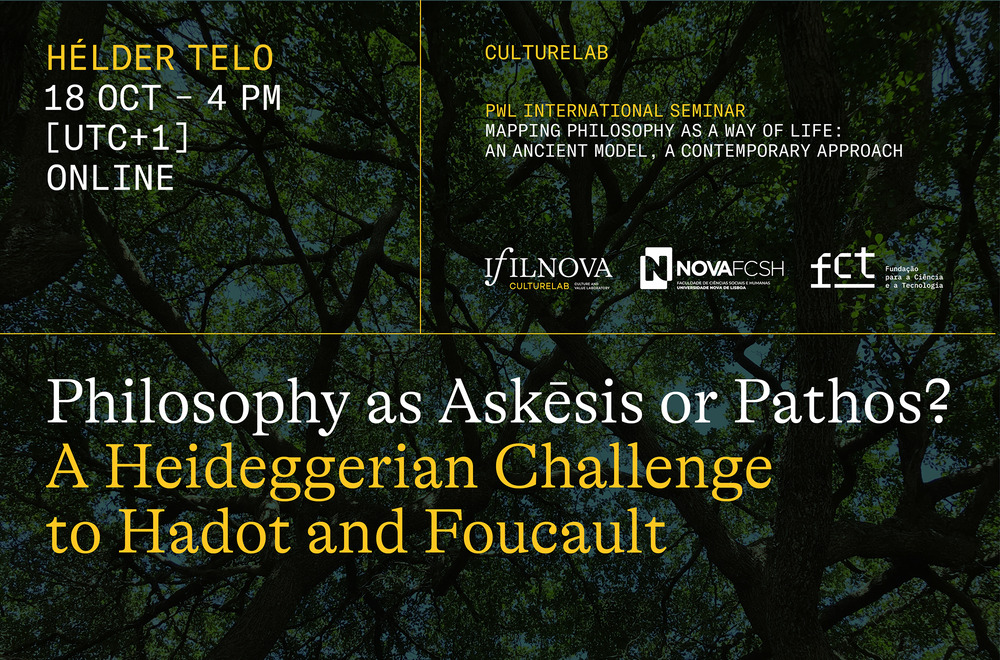HÉLDER TELO
“Philosophy as Askēsis or Pathos? A Heideggerian Challenge to Hadot and Foucault”
October, 18 | 16h00 (UTC+1)
11h00 New York | 12h00 Brasília | 16h00 Lisbon | 17h00 Berlin | Other locations

Abstract
The aim of this paper is to develop a dialogue about the nature of philosophy between Heidegger’s thought in the 1920s and Pierre Hadot’s and Michel Foucault’s metaphilosophical reflections. Hadot and Foucault conceive of philosophy as having an essentially practical or ascetic character (in the ancient sense of askēsis as exercise or training). This conception was inspired by ancient philosophers, but Hadot and Foucault argue that this conception has resurfaced throughout the history of philosophy, and among the philosophers they identify as representatives of this model of understanding philosophy, both include Heidegger. If we focus on what Heidegger says about philosophy in the 1920s, it is certainly possible to recognize multiple moments in which Heidegger stresses that philosophy is much more than theory or discourse and implies an active modification of our way of being or existing. However, one aspect that seems to clash with Hadot and Foucault’s conception is the fact that Heidegger, especially in Being and Time and in the Fundamental Concepts of Metaphysics, associates philosophy with the awakening of a fundamental mood (Grundstimmung). This seems to suggest that philosophy has a fundamentally passive character and not an active one, as Hadot and Foucault argue. However, I will argue that Heidegger’s conception of Grundstimmung and its role in philosophy cannot be reduced to mere passivity. Moods, for Heidegger, possess both an active and passive character, which opens the door to a conception of philosophy that involves a form of asceticism or spirituality (in the Hadotian and Foucauldian sense of these terms) that is essentially affective or emotional and that always depends on an affective or emotional dimension.
Bio
Hélder Telo is currently a research fellow at Praxis: Centre for Ethics, Politics and Culture (University of Beira Interior). He earned his PhD from Nova University of Lisbon in 2018 after writing a thesis on Plato’s critique of unexamined life. An important part of his doctoral research was conducted at the Albert-Ludwigs-Universität Freiburg (where he was a doctoral fellow at the Collaborative Research Center 1015 Muße/Otiose Leisure) and Boston College. Following his PhD, he was a postdoctoral fellow at the Nova Institute of Philosophy (Nova University of Lisbon), where he developed a research project on the art of living and the individual relation to truth in Plato and contemporary thought. His work explores topics such as metaphilosophy, the desire for truth, care and emotions in philosophers such as Plato, Aristotle, the Stoics, Scheler, Heidegger, Hadot and Foucault. His most recent publications include “Plato’s Philosophical Mimesis: On the Pedagogical and Protreptic Value of Imperfection” (Schole, 2022) and “The Care of Others in Marcus Aurelius’ Meditations” (in Philosophy of Care – New Approaches to Vulnerability, Otherness and Therapy, Springer, 2021).
Registration required via email to mapping.pwl@gmail.com
